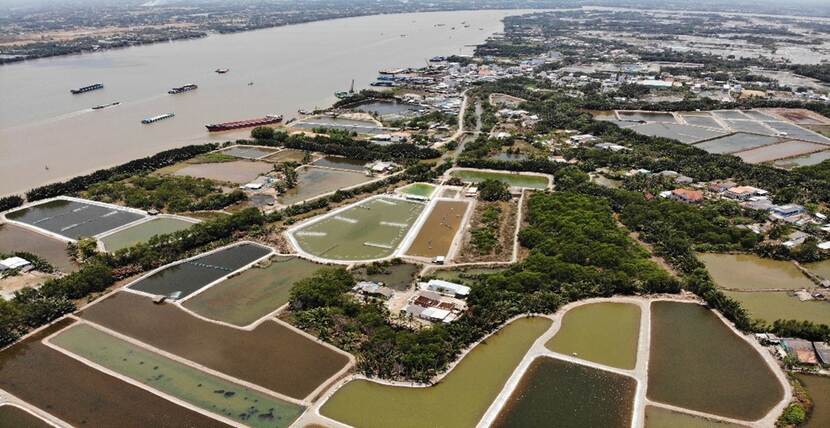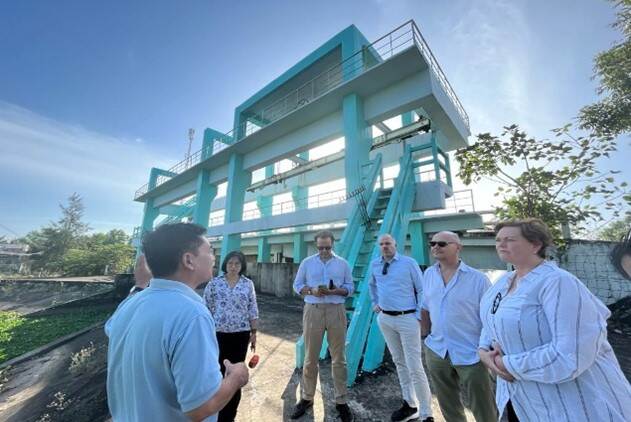Tapping into sustainable shrimp farming in Vietnam
The shrimp industry in Vietnam holds significant importance as a key contributor to the country's economy, offering job opportunities and fueling GDP growth. Nevertheless, this vital sector faces mounting competition and a range of challenges that demand innovative solutions. However, amidst these obstacles lie compelling opportunities for Dutch businesses to actively participate in the sustainable shrimp farming industry in Vietnam. By addressing these challenges together, both countries can forge a mutually beneficial partnership that drives economic growth while promoting sustainable practices in this vital sector.

Overview of Vietnam’s shrimp industry
Vietnam holds a prominent position in the global shrimp market, with impressive export figures. In 2022, the country recorded an export turnover of 11 billion USD, making it one of the top three seafood exporting nations worldwide. Shrimp exports accounted for a significant portion of the country's seafood industry, with Vietnam being the second-largest supplier, contributing to 13-14% of the world's total shrimp export value. To maintain its position as a leading shrimp supplier, Vietnam has set ambitious targets for its shrimp farming and export industry.
By 2023, the country plans to increase its shrimp farming area to 750 thousand hectares, with a target export turnover of over 4.3 billion USD. Vietnam's shrimp farming areas are dominated by black tiger and whiteleg shrimp, with the rest being other shrimp varieties. Looking forward, Vietnam aims to increase its seafood export turnover to 12.5-14 billion USD by 2025, with shrimp playing a crucial role. Vietnam's success in the shrimp industry is a testament to the country's commitment to sustainable aquaculture practices, quality control, and product innovation.
Challenges faced by Vietnam’s shrimp industry
The shrimp industry in Vietnam encounters several challenges that threaten its competitiveness in the global market. One significant issue is the higher cost of Vietnamese shrimp compared to competitors such as India and Ecuador. Currently, Vietnamese shrimp costs 30% more than Indian shrimp and more than twice the cost of Ecuadorian shrimp, impacting Vietnam's market competitiveness. Another major challenge lies in the high cost of controlling antibiotics in the shrimp farming process. Businesses spend billions of VND each year to control antibiotics from farming areas to processing plants.

Moreover, the costs associated with antibiotic control in importing countries are deducted from the selling price, leading to reduced sales opportunities due to lengthy clearance times for samples and test results.
Vietnam also struggles with a lower success rate in shrimp farming compared to rival countries like Thailand and India. Achieving higher success rates of over 60% by 2030 and over 80% by 2035 is a crucial goal for Vietnam. However, inadequate infrastructure, unsuitable technology, high production costs, and limited access to quality products hinder the industry's productivity and efficiency.
Opportunities for Dutch businesses in sustainable shrimp farming in Vietnam
Investing in sustainable shrimp farming in Vietnam presents lucrative opportunities for Dutch businesses. As the second-largest importer of Vietnamese shrimp within the European Union, the Netherlands is well-positioned to leverage its expertise and technologies to drive mutual growth.
Dutch businesses and the government have already taken significant steps towards promoting sustainable shrimp farming in Vietnam. Collaborative initiatives, such as the ShrimpTechVietnam consortium, have been established to improve current shrimp farming practices in the Mekong Delta sustainably. This consortium aims to increase the production of Vietnamese shrimp in a sustainable manner, with Dutch companies actively participating.

The Netherlands Embassy in Vietnam has played a pivotal role in facilitating knowledge exchange and fostering cooperation between Dutch and Vietnamese stakeholders. Visits by the embassy team including ambassador Mr. Kees van Baar, to shrimp farming sites in Mekong Delta highlight the embassy's commitment to exploring opportunities for collaboration and promoting sustainable shrimp farming practices.
The future of sustainable shrimp farming in Vietnam holds tremendous promise for Dutch businesses. Vietnam’s ambitious goal of reaching $10 billion in shrimp exports by 2050 presents a vast and untapped market. The Vietnamese government recognizes this potential and actively supports the industry’s sustainable growth. Dutch businesses can capitalize on this favorable environment by collaborating with Vietnamese partners and tapping into investment incentives, streamlined regulations, and improved market access. By investing in sustainable practices, adopting cutting-edge technologies, and fostering partnerships, Dutch companies can position themselves as leaders in this rapidly expanding sector. The convergence of Dutch expertise with Vietnam’s vision for a sustainable and prosperous shrimp industry offers limitless opportunities for shared success.
Do you have any questions for the agriculture department please send an email to HAN-LNV@minbuza.nl. For the latest updates, news funding opportunities and more follow us on Twitter @AgroVietnam